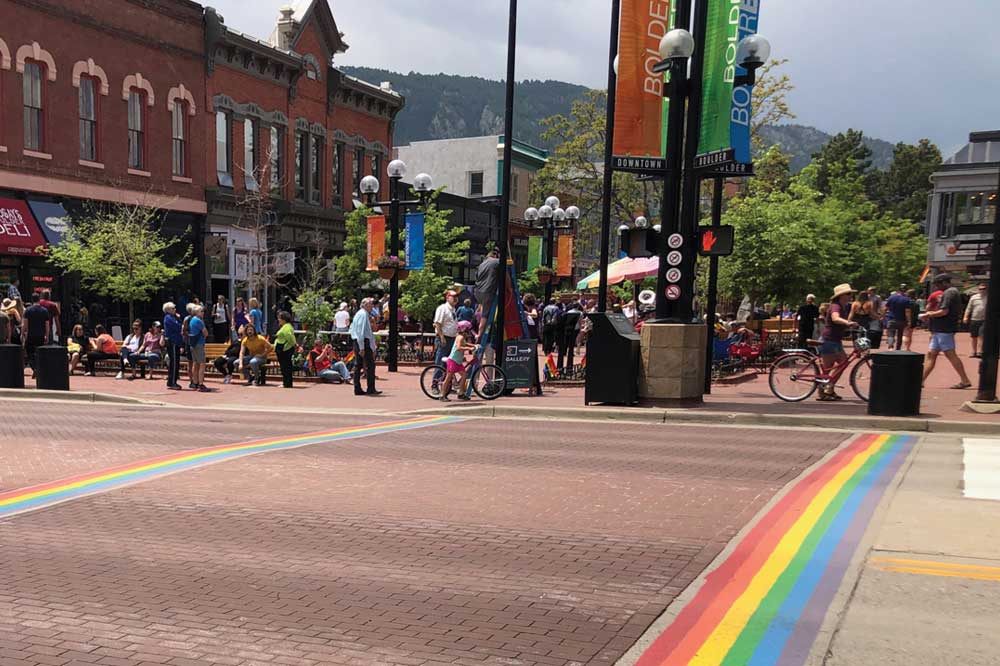
The best time for local governments to be explicitly inclusive of the LGBTQIA+ community was decades ago. The second-best time is right now. The fundamental job of local government is to provide equitable services and opportunities to all who cross paths with our communities. Just as there is a spectrum of identities and beliefs within the LGBTQIA+ population, there is a spectrum of behaviors, policies, and practices local governments should consider implementing to create meaningful strides toward more inclusive organizations and communities. Spoiler alert: it requires more than flying a rainbow flag over city hall during pride month in June—but that’s a good start! This spectrum ranges from individual to organizational to community-wide efforts in our jurisdictions. Within those categories, efforts can range from symbolic and passive support to creating tangible and lasting systems change.
While this article offers one perspective on advancing LGBTQIA+ progress in our profession, the recommendations can be adapted and applied to other issues and identities. All of us weave in and out of nearly infinite combinations of identities when we consider our race, gender, age, sexual orientation, physical and mental ability, religion, veteran status, and other salient characteristics. The different histories and perspectives brought by all of us can help to inform and strengthen the community-building work that we do. When addressing any one angle of inclusiveness we must not lose sight of the others. The journey toward equity is a systemic one. The following suggestions are based on my experience and information gathered from leaders of CivicPRIDE (the first nationally recognized professional association for LGBTQIA+ professionals in local government), and are not intended to cover every possibility. If you or your jurisdiction have other ideas or examples, please help keep this conversation going by reaching out or sharing your own story.
Individual Behavior
I offer these general guidelines to ensure your personal actions demonstrate an individual commitment to supporting LGBTQIA+ colleagues:
- Take Responsibility to Educate Yourself. If you are not currently familiar with the definitions of terms, history, and concerns of the LGBTQIA+ community, it’s time to learn. Please don’t ask your one gay or transgender coworker to teach you, unless you are very confident in your relationship and know that they are willing to put in that effort for you. There are now countless websites, books, articles, podcasts, and films that feature this information.
- Don’t Make Assumptions. Relying on stereotypes to dictate how you interact with others is dangerous. Please don’t assume another’s preferred gender pronoun, sexual orientation, or general proclivities simply because of how they speak, dress, or act. Before stumbling into your coworker’s personal life, I recommend simply being open and receptive to allow them to share themselves with you in their own time. If you have a business need to know something specific (e.g., knowing their preferred pronoun so that you can introduce them in a public setting), simply ask them directly and respectfully.
- Become an Ally. Allyship is a lifelong process of learning and confronting biases within ourselves and others. Allies acknowledge their own privilege and leverage it to support and make space for the progress of historically marginalized groups.
Organizational Policies and Practices
Gender and sexuality are woven into our internal policies and practices in many ways. As CivicPRIDE has developed content for local government professionals, we have identified a wide range of organizational policies that may overtly or unintentionally alienate LGBTQIA+ professionals. These policies include family leave, sexual harassment, anti-discrimination, restroom signage, and dress codes. These policies have historically left LGBTQIA+ professionals invisible. Policies that either dictate different standards based on gender and sexuality, or fail to recognize gender and sexual differences, can serve to reinforce a hostile workplace or prevent your organization from recruiting and retaining talented LGBTQIA+ professionals. Taking the time to audit your current internal policies and practices and ensuring that they are inclusive is a great first step toward improving your organizational culture. In many cases, your organization may have outdated policies that you aren’t even aware of. For example, during new employee orientation of a previous organization I served, I learned that I was technically violating the dress code on day one of my new job. As we were presented an overview of the employee handbook, I learned that women were expected to wear skirts or dresses and men were expected to wear ties. Meanwhile, I was sitting there as a female employee in my first-day-of-work tie and a new pair of slacks. Of course, that dress code was no longer enforced literally, but its existence on record sent an unwelcome message to employees whose clothing choices did not conform to their gender.
A great resource to assess your organization’s level of inclusiveness is the Human Rights Campaign Municipal Equality Index (MEI). This index examines how inclusive municipal laws, policies, and services are of LGBTQIA+ people who live and work there. Cities are rated based on non-discrimination laws, the municipality as an employer, municipal services, law enforcement, and the city leadership’s public position on equality. The 2018 MEI is the seventh annual edition and rates a total of 506 cities on 49 different criteria from every state in the nation. While not every city is included, the index can serve as a guide for all communities. Learn more at www.hrc.org/mei.
Community Outreach and Engagement
The number of cities and counties across the U.S. offering public support for their LGBTQIA+ community members continues to grow. This past June during pride month, I watched over social media as rainbow flags were raised and declarations were read in jurisdictions large and small. Some cities and counties took an extra step to participate in their local pride parade or host an engagement event bringing together community partners and organizations working for the advancement of the LGBTQIA+ community. While largely symbolic, these images and events serve to send a clear message of inclusiveness. If your community does not currently participate, please consider opportunities to send that message.
For cities and counties working to expand their efforts toward inclusiveness beyond the symbolic, your community partners and LGBTQIA+ residents should be invited to the table to generate ideas. For example, in Boulder, Colorado, our city is working to revise our code and charter to reflect gender-inclusive language and bring any policies related to gender and sexuality up to date. This effort grew from the encouragement of a community organization, Out Boulder County, and with support from our Human Relations Commission. To maximize success, the city is currently seeking public input on the recommendations made by Out Boulder County prior to bringing the revisions back to our City Council for approval.
Inclusiveness Grounded in Ethics
As someone who is both gay and obsessed with local government management, I believe the strongest argument for inclusiveness is grounded in our professional ethics. We serve a profession that was first created to ensure equitable service delivery that is protected from partisan politics. Tenet 4 of the ICMA Code of Ethics comes to mind: “Serve the best interests of the people.” Our guidelines tell us that this means we must understand and inform our governing body of the anticipated effects of a decision on people in their jurisdictions, especially if specific groups may be disproportionately harmed or helped. They also ask us to ensure that all people within our jurisdictions have the ability to actively engage with their local government and strive to eliminate barriers to public involvement in decisions, programs, and services. While I want to believe that all of us support the ideal of Tenet 4, I know that all of us have significant work to do to live up to that commitment on behalf of historically marginalized communities.
My Own Journey
I began the journey to my local government career during my first semester of my Master of Public Administration program in the fall of 2011. The most common piece of advice I was given was to find a mentor, someone who could help inform my professional development and lend an experienced perspective when I experienced challenges. At the time, I did not know of any LGBTQIA+-identified local government managers, and I did not have the confidence to ask to be mentored by one. That desire was not intended to disregard the value of the many mentors, professors, and supervisors who did support me through my formative years as a young professional. However, it would have made a huge difference in my own self-confidence to be able to confide in someone who understood my experience as a gay woman and could help me wrestle with questions such as whether as a woman I could wear a suit and tie to an interview without fear, or if bringing a date to a networking event was out of the question. While I had always felt welcome in my new chosen profession, I didn’t know how I fit into it, and I set boundaries to protect myself.
Everything changed when I received the ICMA 100th anniversary issue of PM Magazine in September 2014, in which Phil Smith-Hanes wrote an article titled, “A New Frontier in Diversity.” I had never felt more welcome in the profession than when I read that article. Finally, someone was telling me that I belonged and there were others like me out there who were serving authentically and openly in their communities. Connecting with Phil and other LGBTQIA+ professionals at that year’s annual conference is what set the stage for the CivicPRIDE we have today.
Keeping the Momentum Going
On September 23, 2018, the first night of the annual ICMA conference in Baltimore, I was staffing the CivicPRIDE table at a reception bringing together a variety of local government affinity and resource groups. One attendee stood out. As she entered the space, she scanned the room and locked her eyes on our bright rainbow CivicPRIDE poster. Her face brightened as she jogged the entire 30 yards across the room and right up to our table, exclaiming, “At last! I have found my people!”
I wish that this young professional felt this immediate sense of belonging walking into any room hosted by local government leaders. Her amazing reaction to the growth of CivicPRIDE took me through many different emotions:
- Joy, that the space we have created brings happiness and a sense of belonging to many of our colleagues;
- Sadness, that it has taken so many in our profession far too long to “find their people”;
- Relief, that the effort we are expending is having a direct impact; and
- Determination, that now that we have begun our work, we cannot let this momentum fade.
Maintaining that momentum is going to require all of us to continue to push for greater inclusiveness.

PAM DAVIS is an assistant city manager in Boulder, Colorado, and chair of CivicPRIDE, the first nationally recognized professional association for LGBTQIA+ professionals in local government (davisp@bouldercolorado.gov; @heypamdavis).
New, Reduced Membership Dues
A new, reduced dues rate is available for CAOs/ACAOs, along with additional discounts for those in smaller communities, has been implemented. Learn more and be sure to join or renew today!
